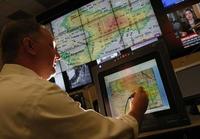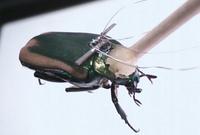-
Digital DNA the new DNA
With the increasing ubiquity of computers, smart phones, and other electronic devices comes a torrent of “digital DNA,” which can be used to record an individual’s every move and even convict them of a crime
-
-
Georgia to build privately funded first responder training center
A local firm in Georgia is set to build a privately funded training facility for first responders that would bring more than 100 jobs to Perry; the sophisticated training center, built by Guardian Centers of Georgia, would help prepare first responders for natural disasters and terrorist attacks
-
-
LAPD to rely solely on computers to fight crime

In an unprecedented move, for the next three months the Los Angeles Police Department (LAPD) will rely entirely on computer software to decide where to deploy patrol officers; the predictive analytics software examines data from past crimes to determine when and where certain crimes are likely to occur next so police can be on hand to stop them before they are committed
-
-
Insects to become first responders, aid in search and rescue

Researchers are finding ways to harvest energy from insects, holding the promise of using insects to aid in first response and search and rescue, and monitor hazardous situations before sending in humans
-
-
Early 9/11 responders at greater risk of heart disease
A new study warns that 9/11 responders who arrived immediately after the attacks could be at greater risk of heart disease; researchers examined the blood vessel walls of thirty-one 9/11 responders and found that the nineteen men and women who went to work before 13 September had much greater damage to their blood vessel walls than those who arrived later
-
-
DHS takes down suspected Mexican gang members in New York

On 16 November DHS agents arrested twenty-five suspected members of the Mexican Los Vagos gang on a variety of charges including murder conspiracy, assault, firearms offenses, narcotics trafficking, and immigration violations. Los Vagos allegedly used drug trafficking and violence to defend their turf from the Latin Kings, a rival gang
-
-
NYPD spying on Muslims leads to spiral of mistrust
Following the revelation that the New York City police department was spying on the daily lives of ordinary Muslims, community activists have launched a campaign encouraging people to avoid directly reporting suspicious activity to the police
-
-
Pennsylvania’s homeland security office to operate out of state police HQ
The Pennsylvania Governor’s Office of Homeland Security will move its operations to the Pennsylvania State Police (PSP) headquarters in Harrisburg; the office was merged into the Pennsylvania Emergency Management Agency (PEMA) during the previous administration, but the governor determined that relocating the office to the state police headquarters would result in an even greater combination of intelligence gathering and sharing
-
-
Harvard-designed swarm robots licensed to Swiss company

Harvard researchers developed Kilobot — a low-cost, easy-to-use robotic system for advancing development of “swarms” of robots; robot swarms might one day tunnel through rubble to find survivors, monitor the environment and remove contaminants, and self-assemble to form support structures in collapsed buildings
-
-
Irish police consider deploying drones

Police in northern Ireland are considering deploying small surveillance drones to help combat crime and the dissident republican threat as an alternative to helicopters; with police suffering budget shortages, many agencies cannot afford the roughly £7 million, or $11 million, a year it takes to maintain a helicopter
-
-
Overcoming full disk encryption in digital investigations
The increasing use of full disk encryption (FDE) can significantly hamper forensic digital investigations, potentially preventing access to all digital evidence in a case
-
-
Device allows summoning help where no cellular coverage is available
People who work or travel in remote places often find themselves in areas where there is no cellular coverage; summoning emergency help is thus difficult, if not impossible; a Colorado company offers a solution
-
-
Pre-crime detection scanners raise legal, scientific issues
DHS has successfully tested a pre-crime detection scanner on humans. The scanners gauge facial expressions and other biometric data to detect whether someone is giving cues for mal-intent. The DHS algorithm also includes scanning a person’s gender, ethnicity, breathing, and heart rate in a non-intrusive way through video and audio scanning. Critics want to know whether Americans agree that it is worth their safety interests to be watched in every public space, or will pre-crime scanning cross certain privacy rights?
-
-
Unused DHS fund help Pasadena upgrade helos
The city of Pasadena will use leftover funds from the 2008 Homeland Security Act to purchase a number of upgrades for its air operations unit; on 13 November the city council approved spending the remaining $650,000 of the original grant to purchase an array of high-tech devices, including an infrared camera, night-vision technology, and quiet technology tail rotor blades
-
-
New Jersey first responders to get universal IDs
Starting next year, 12,000 first responders in New Jersey will receive special IDs to help enhance security and cut down on identity fraud during emergencies and natural disasters
-
More headlines
The long view
Why Ukraine’s AI Drones Aren’t a Breakthrough Yet
By David Kirichenko
Machine vision, a form of AI, allows drones to identify and strike targets autonomously. The drones can’t be jammed, and they don’t need continuous monitoring by operators. Despite early hopes, the technology has not yet become a game-changing feature of Ukraine’s battlefield drones. But its time will come.
